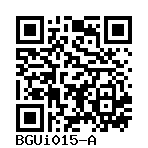BGUiBJ
BGUi015-A
General
Cell Line |
|
| hPSCreg name | BGUi015-A |
| Cite as: | BGUi015-A (RRID:CVCL_A4YN) |
| Alternative name(s) |
BGUiBJ
|
| Cell line type | Human induced pluripotent stem cell (hiPSC) |
| Similar lines | |
| Last update | 27th January 2021 |
| User feedback | |
Provider |
|
| Generator | Ben Gurion University of the Negev (BGU) |
| Owner | Ben Gurion University of the Negev (BGU) |
| Distributors | |
| Derivation country | Israel |
External Databases |
|
| BioSamples | SAMEA8093244 |
| Cellosaurus | CVCL_A4YN |
| Wikidata | Q107113462 |
General Information |
|
| * Is the cell line readily obtainable for third parties? |
Yes Research use: allowed
Clinical use: not allowed
Commercial use: not allowed
|
Donor Information
General Donor Information |
|
| Sex | male |
Phenotype and Disease related information (Donor) |
|
| Diseases | No disease was diagnosed.
|
| Family history | No |
| Is the medical history available upon request? | No |
| Is clinical information available? | No |
Karyotyping (Donor) |
|
| Has the donor karyotype been analysed? |
Unknown
|
Other Genotyping (Donor) |
|
| Is there genome-wide genotyping or functional data available? |
No
|
Donor Relations |
|
| Other cell lines of this donor | |
External Databases (Donor) |
|
| BioSamples | SAMEA5574031 |
Ethics
| Has informed consent been obtained from the donor of the embryo/tissue from which the pluripotent stem cells have been derived? | Yes |
| Was the consent voluntarily given? | Yes |
| Has the donor been informed that participation will not directly influence their personal treatment? | Yes |
| Can you provide us with a copy of the Donor Information Sheet provided to the donor? | No |
| Do you (Depositor/Provider) hold the original Donor Consent Form? | No |
| If you do not hold the Donor Consent Form, do you know who does? | Yes |
| Please indicate whether the data associated with the donated material has been pseudonymised or anonymised. | anonymised |
| Does consent explicitly allow the derivation of pluripotent stem cells? | Yes |
| Does consent prevent CELLS DERIVED FROM THE DONATED BIOSAMPLE from being made available to researchers anywhere in the world? | No |
Does consent permit research by | |
| an academic institution? | Yes |
| a public organisation? | Yes |
| a non-profit company? | Yes |
| a for-profit corporation? | No |
| How may genetic information associated with the cell line be accessed? | Open Access |
| Will the donor expect to receive financial benefit, beyond reasonable expenses, in return for donating the biosample? | No |
| Has a favourable opinion been obtained from a research ethics committee, or other ethics review panel, in relation to the Research Protocol including the consent provisions? | No |
| Has a favourable opinion been obtained from a research ethics committee, or other ethics review panel, in relation to the PROPOSED PROJECT, involving use of donated embryo/tissue or derived cells? | No |
| For generation of the cell line, who was the supplier of any recombined DNA vectors or commercial kits used? | |
hIPSC Derivation
General |
|
| Source cell line name |
BJ Other names
Derived from same source line (potentially other lot and donor, see below):
|
| Source cell type |
Synonyms
|
| Source cell origin | |
| Source cell type (free text) | ATCC® CRL-2522 |
Reprogramming method |
|
| Vector type | Non-integrating |
| Vector | Sendai virus |
| Genes | |
| Is reprogramming vector detectable? |
Unknown |
Vector free reprogramming |
|
Other |
|
| Derived under xeno-free conditions |
Unknown |
| Derived under GMP? |
Unknown |
| Available as clinical grade? |
Unknown |
Culture Conditions
| Medium |
Other medium:
Base medium: NutriStem
Main protein source: Serum concentration: % |
Characterisation
Analysis of Undifferentiated Cells
Differentiation Potency
In vitro spontaneous differentiation
| Marker | Expressed |
| ACTA2 |
Yes |
Morphology
In vitro spontaneous differentiation
| Marker | Expressed |
| NEFL |
Unknown |
Morphology
Genotyping
Karyotyping (Cell Line) |
|
| Has the cell line karyotype been analysed? |
Yes
normal
Karyotyping method:
G-Banding
|
Other Genotyping (Cell Line) |
|


Login to share your feedback, experiences or results with the research community.